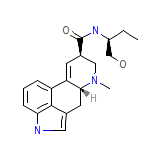Partergin




Partergin Brand names, Partergin Analogs
Partergin Brand Names Mixture
- No information avaliable
Partergin Chemical_Formula
C20H25N3O2
Partergin RX_link
http://www.rxlist.com/cgi/generic2/methylerg.htm
Partergin fda sheet
Partergin msds (material safety sheet)
Partergin Synthesis Reference
A. Stoll et al., eidem, Helv. Chim. Acta. 26, 944 (1943)
Partergin Molecular Weight
339.432 g/mol
Partergin Melting Point
172 oC
Partergin H2O Solubility
25 mg/mL
Partergin State
Solid
Partergin LogP
1.01
Partergin Dosage Forms
Injection (intramuscular or intravenous); Tablet
Partergin Indication
For the prevention and control of excessive bleeding following vaginal childbirth
Partergin Pharmacology
Methylergonovine is a semisynthetic ergot alkaloid and a derivative of ergonovine and is used for the prevention and control of postpartum and post-abortion hemorrhage. In general, the effects of all the ergot alkaloids appear to results from their actions as partial agonists or antagonists at adrenergic, dopaminergic, and tryptaminergic receptors. The spectrum of effects depends on the agent, dosage, species, tissue, and experimental or physiological conditions. All of the alkaloids of ergot significantly increase the motor activity of the uterus. After small doses contractions are increased in force or frequency, or both, but are followed by a normal degree of relaxation. As the dose is increased, contractions become more forceful and prolonged, resting tonus is markedly increased, and sustained contracture can result.
Partergin Absorption
Absorption is rapid after oral (60% bioavailability) and intramuscular (78% bioavailability) administration.
Partergin side effects and Toxicity
Signs and symptoms of overexposure: hypertension, seizures, headache, hypotension, nausea, and vomiting.
Partergin Patient Information
Partergin Organisms Affected
Humans and other mammals














